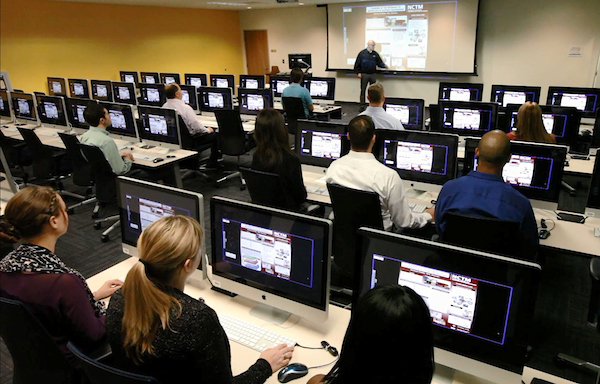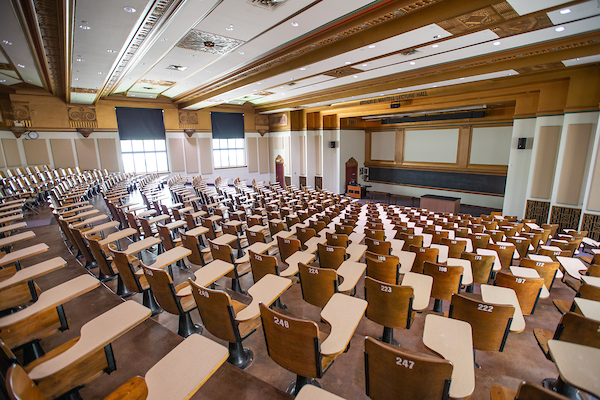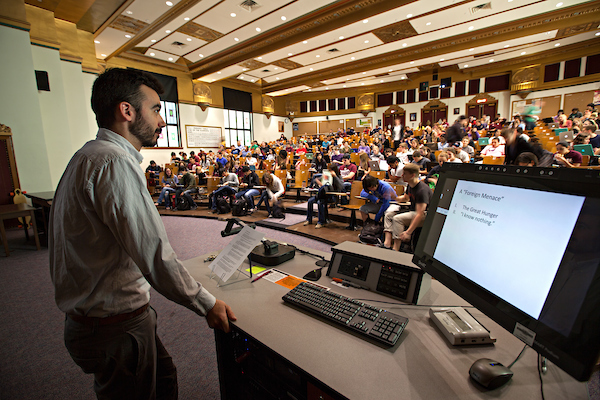Texas A&M University has awarded the title of University Distinguished Professor, its highest faculty award, to eight scholars. The 2023 University Distinguished Professors represent the Colleges of Arts & Sciences and Engineering, as well as the Schools of Medicine, Law and Public Health.
The University Distinguished Professor designation is bestowed upon faculty members who are preeminent in their fields and have made at least one transformational contribution or provided an intellectually substantial “leap forward” in their discipline. This particularly exceptional faculty cohort has made significant contributions and inspired innovative thought in smart/autonomous computational and robotic systems, process manufacturing system optimization, the genetic factors critical to drug metabolism and cancer research, immigration law and environmental and nuclear chemistry.
These faculty individually and collectively demonstrate Texas A&M’s strengths in providing transformational education for our students and translational research discoveries that impact our state, nation and the world. The 2023 Texas A&M University Distinguished Professors are:

Perla Beatriz Balbuena
College of Engineering
Artie McFerrin Department of Chemical Engineering
Perla Beatriz Balbuena received her Ph.D. in chemical engineering from The University of Texas at Austin in 1996 and joined the Artie McFerrin Department of Chemical Engineering at Texas A&M University as a professor in 2004. She currently holds the T. Michael O’Connor Chair I.
Her research focuses on interfacial and surface catalysis, electrochemistry and corrosion reactions; prediction of thermodynamic and transport properties and first principles materials design. Dr. Balbuena’s major contributions include: pioneering work to identify the chemical and electrochemical reaction mechanisms and products of electrolyte decomposition at electrode/electrolyte interfaces of lithium-ion and advanced battery technologies; discovering new ways to characterize solvent and other environmental effects on homogeneous and heterogeneous catalytic reactions; and the establishment of critical first principles design of materials and processes for molecular based gas capture and separations of components from mixtures. Her research breakthroughs and technical innovations have had a profound impact in the development of materials for lithium-ion batteries and advanced high energy density batteries.
Dr. Balbuena received the CAREER award from the National Science Foundation in 1999. She was elected by her peers as Fellow of the American Association for the Advancement of Science in 2013 and Fellow of the American Institute of Chemical Engineers in 2020. She was also elected as a Fellow of the Electrochemical Society in 2022 for her significant contributions in electrochemistry.
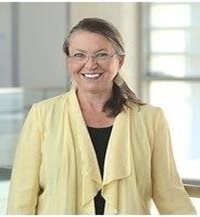
Deborah Bell-Pedersen
College of Arts & Sciences
Department of Biology
Deborah Bell-Pedersen received her Ph.D. in molecular biology in 1991 from the State University of New York at Albany. Following postdoctoral studies at Dartmouth Medical School, she joined the biology faculty at Texas A&M University in 1997, rising to professor in 2007.
Dr. Bell-Pedersen is recognized as a leader in determining how the circadian clock controls daily rhythms in protein production, a process that is critical to human health and drug metabolism. Her lab made the breakthrough discovery that most of this regulation is through clock control of mRNA translation factors and the protein composition of ribosomes. A related transformative discovery from Dr. Bell-Pedersen’s lab is that the circadian clock controls how accurately ribosomes translate a mRNA to produce the correct sequence of amino acids in a protein. Importantly, aging is associated with both reduced circadian rhythm amplitude and decreased translation accuracy. An exciting outcome of her work is the potential that increasing circadian amplitude would improve translation fidelity, slow down the aging process and reduce age-associated disease.
In recognition of her research accomplishments, Dr. Bell-Pedersen was awarded the Texas A&M Jo Ann Treat Award for Excellence in Research, Texas A&M University Women Former Students’ Network Eminent Scholar Award and the Texas A&M Association of Former Students Distinguished Achievement Award for Research. She was granted the honorary title of University Professor and is an elected Fellow of the American Academy of Microbiology and an elected Fellow of the American Association for the Advancement of Science.
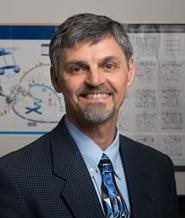
Roderick H. Dashwood
School of Medicine
Department of Translational Medical Sciences
Roderick H. Dashwood received his Ph.D. in 1986 from the University of Portsmouth in the U.K. and earned a postdoctoral appointment at Oregon State University (1986-90) and assistant/associate professor positions at the University of Hawaii (1990-98). He returned to Oregon State University in 1997 as director of the Cancer Chemoprotection Program and Helen Rumbel Professor for Cancer Prevention at the Linus Pauling Institute. In 2013, Dr. Dashwood joined Texas A&M Health as director of the Center for Epigenetics & Disease Prevention and John S. Dunn Chair in Disease Prevention, with tenure as a professor in the School of Medicine’s Department of Translational Medical Sciences.
His specialties encompass genetic/epigenetic/immunological mechanisms and colorectal cancer, including the seminal discovery of the histone deacetylase inhibitory activity of sulforaphane and its role in altered epigenetic ‘reader’ pools - this was transformational for the field, dovetailing cell-based assays, preclinical models and human translation in epigenetics/diet/cancer interception.
With an h-index of 74, Dr. Dashwood’s scholarly activities comprise more than 350 abstracts, book chapters and peer-reviewed publications in respected oncology journals such as Molecular Cancer, Seminars in Cancer Biology, Cancer Research and Oncogene. His professional honors include Regents’ Medals for Excellence in Teaching (1995) and Research (1997), the Rice University Institute of Biosciences & Bioengineering Medical Innovation Award (2017) and being named a Fellow of the Royal Society of Biology (2017). Dr. Dashwood served as chair of the NIH Cancer Prevention Study Section (2020-2022) and is listed in the upper quartile of Stanford University’s list of the world’s top 2% of scientists, comprising the most-cited authors across all disciplines, according to Stanford University.
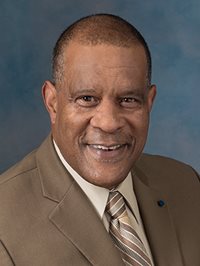
James Hubbard Jr.
College of Engineering
Mike Walker '66 Department of Mechanical Engineering
James Hubbard Jr. earned his Ph.D. in 1982 from the Massachusetts Institute of Technology and joined the J. Mike Walker ’66 Department of Mechanical Engineering in 2018, where he currently holds the Oscar S. Wyatt, Jr., ’45 Chair I.
His research areas include smart structures, shape control and control of distributed parameter systems. Dr. Hubbard is internationally known and respected as the founding father of the field of adaptive structures - he conceived, designed and demonstrated a novel technique for structural control that was transformational in his field. The technique involved the incorporation of active materials embedded in lightly damped structures and used to sense, actuate and control the structures. The concept of smart materials and concomitant systems is now ubiquitous worldwide and Dr. Hubbard was recently awarded the ASME Adaptive Structures and Smart Materials Award which is the field’s highest honor.
He has more than 150 publications, has authored or co-authored four books and his latest book was featured by the AIAA as Book of the Month in May 2022. Dr. Hubbard has been a member of the National Academy of Engineering since 2016 and is a Fellow of the National Academy of Inventors. Dr. Hubbard’s awards and professional society recognitions include induction into The Academy of Medicine, Engineering and Science of Texas, Permanent Fellow of the Hagler Institute for Advanced Study at Texas A&M, American Society of Mechanical Engineers (ASME) Fellow, American Institute of Aeronautics and Astronautics (AIAA) Fellow, Society of Photonics and Instrumentation Engineers (SPIE) Fellow and recipient of the SPIE Smart Structures and Materials Lifetime Achievement Award.
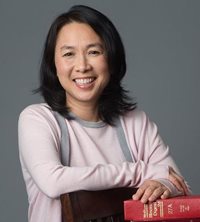
Huyen Pham
School of Law
Huyen Pham is a professor of law and associate dean for faculty research & development at Texas A&M University’s School of Law. She received her Juris Doctorate cum laude from Harvard Law School in 1996 and joined the Texas A&M law faculty in 2013.
Professor Pham is a renowned scholar of immigration law, and her research focuses on the increasingly central role of sub-federal governments—states, cities, and counties—in immigration regulation. With her insightful research, including her creation of the unique Immigrant Climate Index, she has established herself as a pioneer in the field of immigration federalism. Professor Pham’s work has laid the legal and policy foundations for later debates about sanctuary cities, private party enforcement and the economic impact of sub-federal regulation.
Her research has been published in top law journals including the New York University Law Review and the Georgetown Law Journal, and she has received research funding from the Russell Sage Foundation and the Carnegie Corporation. Professor Pham is a member of the American Law Institute, won the 2018 Eminent Scholar Award (jointly awarded by Texas A&M University and the Women Former Students’ Network), received the Chancellor’s EDGES fellowship (2021) and was a Fulbright Scholar (University of Economics and Law, Vietnam National University).
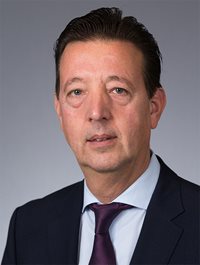
Efstratios N. Pistikopoulos
College of Engineering
Artie McFerrin Department of Chemical Engineering
Efstratios N. Pistikopoulos received his Ph.D. in chemical engineering from Carnegie Mellon University in 1988 before joining the Artie McFerrin Department of Chemical Engineering as a professor in 2015, where he currently holds the Dow Chemical Chair. He also serves as the director of the Texas A&M Energy Institute.
Dr. Pistikopoulos’ research focuses on systematic multiscale modeling, control and optimization of sustainable, circular energy and manufacturing systems, most notably in process design and operations; life‐cycle analysis and assessment of chemical processes and their supply chains; and circular economy. He is an internationally recognized academic leader in advanced model‐based control with extensive publications covering many areas of process and energy systems engineering that have had a lasting impact in both the academic and industrial sectors.
Dr. Pistikopoulos is a Fellow of the Royal Academy of Engineering, the American Institute of Chemical Engineers (AIChE) and the Institution of Chemical Engineers (IChemE). He is also the editor‐in‐chief of the journal Computers & Chemical Engineering. Some of Dr. Pistikopoulos’s most notable awards include co‐recipient of the prestigious Mac Robert Award and Gold Medal from the Royal Academy of Engineering (2007), the Computing in Chemical Engineering Award of CAST/AIChE (2012), the Sargent Medal from IChemE (2020) and the AIChE Sustainable Engineering Forum Award (2021). Dr. Pistikopoulos was honored with The Association of Former Students Distinguished Achievement Award for Research in 2022.
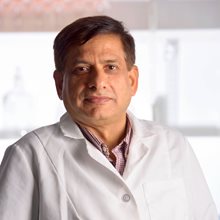
Virender K. Sharma
School of Public Health
Department of Environmental & Occupational Health
Virender K. Sharma received his Ph.D. from the University of Miami’s Rosenstiel School of Marine and Atmospheric Science in 1989. He joined Texas A&M in 2014 as a professor in the School of Public Health’s Department of Environmental and Occupational Health. Dr. Sharma also serves as the director of the school’s Environment and Sustainability Program.
His research has made seminal contributions in the areas of chemistry and applications of ferrate. Dr. Sharma’s groundbreaking and transformational research solved the historical technical challenges by creating “liquid ferrate,” which can be produced using a simple and cost-effective process that remains shelf-stable for months, as compared to other forms of ferrate, which break down over the course of a few hours. His research led to the kinetic and mechanistic understanding of ferrate chemistry that may address global challenges in water quality, infectious diseases and food safety. Dr. Sharma has also performed pioneering research on engineered and natural nanoparticles in water.
He is serving as an associate editor or editorial contributor for several international journals and has published more than 420 peer-reviewed journal publications (Citations > 34,100 and H-Index: 88). Dr. Sharma has been recognized as a Highly Cited Researcher (Top 1%) by the Web of Science. His distinguished awards include Fellow of the American Association for the Advancement of Science, the American Chemical Society and the Royal Society of Chemistry; Steven K. Dentel AEESP Award for Global Outreach and Bush Excellence Award for International Research.

Sherry J. Yennello
College of Arts & Sciences
Department of Chemistry
Sherry J. Yennello received her Ph.D. in nuclear chemistry from Indiana University in 1990. She joined Texas A&M as an assistant professor in 1993 and is well known for research using isotopically selected beams to study the dynamics and thermodynamics of nuclear collisions - including one of the first-ever experiments induced by a radioactive beam.
Her research on the nuclear equation-of-state impacts such fundamental questions as, “What is the origin of the elements?” and “How are neutron-rich and heavy nuclei synthesized in the core of a star during stellar evolution?” This transformational research has been recognized with the American Chemical Society’s (ACS) highest honor in her field – the ACS Glenn T. Seaborg Award in Nuclear Chemistry, as well as the ACS Garvin-Olin Medal and Fellowships in the American Chemical Society, the American Physical Society, and the American Association for the Advancement of Science. Dr. Yennello has also received the Sigma Xi National Young Investigator Award, the NSF Young Investigator Award, the Oak Ridge Associate Universities Junior Faculty Enhancement Award and the American Physical Society Division of Nuclear Physics Mentoring Award.
She is the Principal Investigator and Director for two Department of Energy Centers of Excellence, the Cyclotron Institute and the Center for Excellence in Nuclear Training and University-Based Research. Most recently, Dr. Yennello has applied her extensive experience studying nuclear reactions to the production of medically relevant isotopes. She is recognized as an advocate for creating opportunities for scientists from underrepresented backgrounds to advance their research careers.
To learn more about the University Distinguished Professor award program, click here.

